In this Building Better Business interview, we meet Galahad Clark, cofounder of B Corp-certified shoe manufacturer Vivobarefoot.
Galahad describes himself as a seventh-generation cobbler - his family are behind the famous Clarks shoe brand, founded in Somerset in the early 19th Century.
Vivobarefoot's goal is to produce "regenerative footwear and experiences to bring you closer to nature". Its shoes are designed to improve human health and have a minimal impact on the planet. 80% of pre-tax profit is invested in its social and environmental projects which include initiatives around materials and the supply chain, recycling, health and the environment.
Galahad talked to us about the history and development of Vivobarefoot, its sustainability and health initiatives, the concept of regenerative leadership and why he says "we're obsessed with community, honestly".
Galahad - tell us about Vivobarefoot please - what's the origin story as Marvel fans would say?
“In a roundabout way, the origin story of Vivobarefoot probably started in the 19th Century, seven generations ago. My forefathers, Quaker sheep farmers in Somerset, made a slipper out of sheepskins that they’d started tanning.
They went on to build a pretty interesting shoe company [Clarks], and like many Quaker businesses, they were pioneers of the intersection of business and social justice.
They were building real communities and companies that provided real value to society.
Amazingly, in the 19th century, Clarks was actually at the forefront of making what I would deem as almost perfect shoes. If you look at advertising from the 1860s, they talk about the importance of preserving the natural shape of a child's foot, and how easy it is to restore the natural shape of your own feet.
The shoes of the day and age were sort of Victorian hobnail boots, so Clarks pioneered soft wide shoes, way back when.
When I was in my teens, I witnessed the family lose control of Clarks. A beautiful Quaker business, being taken over by short-term shareholder capitalist values and 80s and 90s capitalism.
I witnessed a lot of the people and family members in the Quaker business world feeling desperate about what was happening to what was a beautiful business. And we saw that with many other businesses around that time as well - Cadbury's is another good example though there are many others.
I grew up in Somerset, but I went to study in America, and kind of wanted to get away from the whole shoe thing in many ways because it surrounded me all my life.
When I was in America, there was a music group that I was really inspired by, who were into Clarks shoes. Shamelessly it was my way to go and hang out with Wu Tang Clan…shoes are temporary but Wu Tang is forever…
After that I got involved in a couple of shoe projects - I got slightly sucked into the shoe business for the love of music. A friend who was a student at the Royal College of Arts came to me with an idea. He kept on getting injured, and through the Alexander Technique he'd learned about the benefits of barefoot and postural alignment.
He'd taken a Nike Huarache shoe, cut the sole out of it and stitched on a tennis racket cover. He brought it to me and said, look, this is the way shoes should be made. And I instinctively really loved the idea.
We pursued it through a period of study, theoretical and practical, playing around trying to figure out how to make barefoot shoes, studying the foot and anatomy and biomechanics.
It’s remarkable how few people in the shoe industry really understand feet and biomechanics.
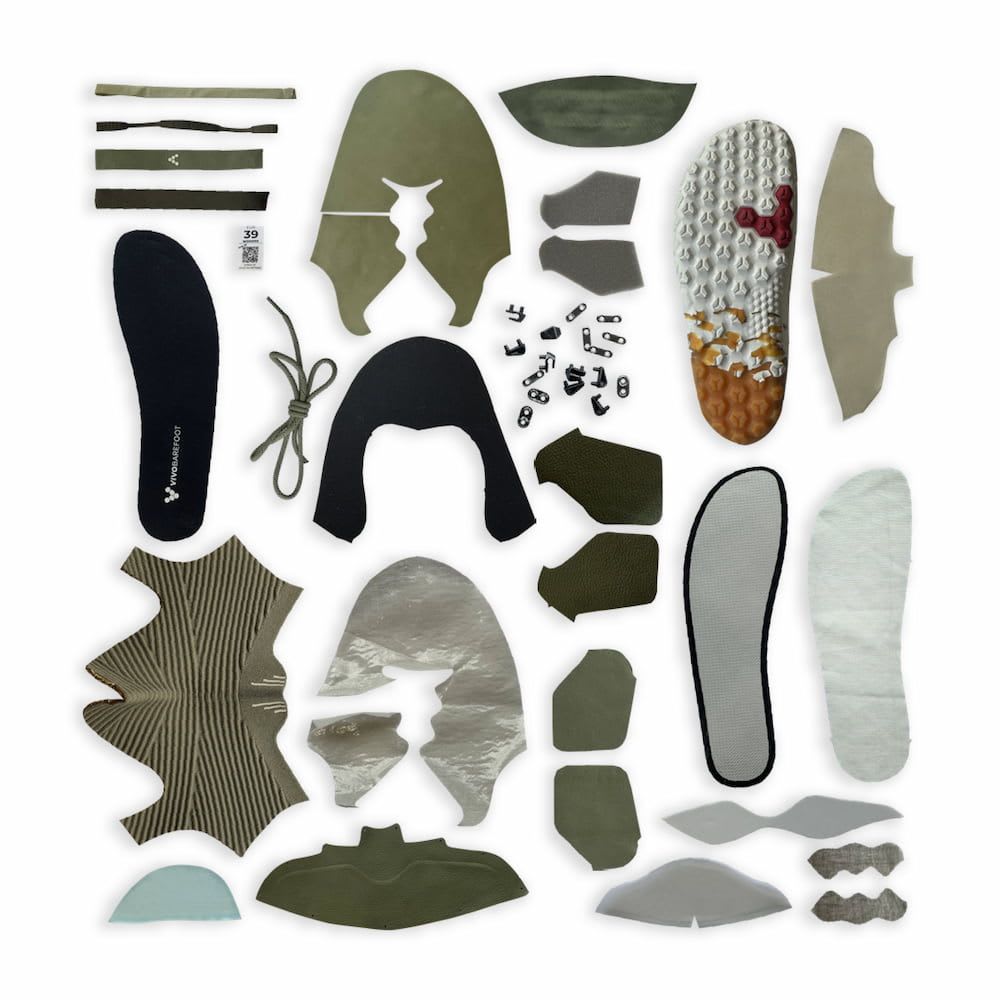
The more I learned, the more I experienced, I realised this was something you can't “unknow” – it was a truth that couldn't be unknown.
In 2012 I dropped everything else I was doing to completely focus on Vivobarefoot. I’d tried to licence it to other companies, or at least persuade other big shoe companies - Clarks included - to do it.
But for one reason or another, they always wanted to dilute it or slightly dumb down the whole thing.
I always felt it was a bigger idea than I could ever do justice to, but having been rejected, left, right and centre, we felt we had to do it ourselves.
So in 2012 we went all in and almost went immediately bankrupt. We got overexcited by research coming out of Harvard, and thought that the Barefoot thing was going to completely sort of explode. There was a brand called Vibram Fivefingers that became quite a big thing in America, and they ended up settling a class action lawsuit, which didn't help matters.
The whole thing slightly stuttered between 2012 and 2015/16. We were just surviving and fighting every day to not go bankrupt. Then we did a crowdfund in 2016, which saved our bacon.
We really needed the money, and the crowd came to the rescue and that was a real turning point.
The community came together, we were getting our stuff together, and since then we've been on a really positive, profitable trajectory.
And I feel like this is now a life's mission for as far as I can see into the future. In many ways it always feels like day one."
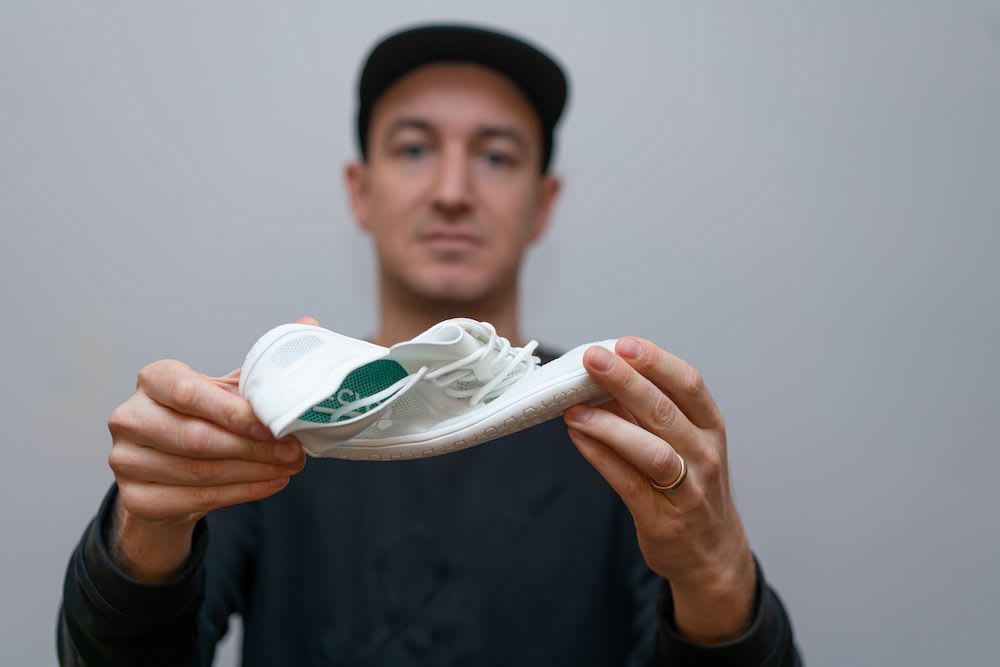
Can you tell us what is regenerative footwear for people who haven't heard of it before?
"Regeneration is obviously an exciting buzzword that’s being bandied around all over the place now, and in many ways, it’s an advancement on sustainability.
The way we look at regeneration is that “sustainable” is keeping things as they are, but regeneration is literally a net positive, and much more than that.
Regeneration is about going from a mechanistic approach to organizations and business, to a living systems approach.
When it comes to footwear itself, it's about working with nature, working with natural movement, working with the natural foot. It’s the same thing with how we organize the business and the value chains.
Sustainability is not enough anymore.
Being part of nature, rather than trying to manipulate nature in any way, is the paradigm that is at the heart of regeneration.
A brand like Patagonia might say “we're in business to save the Earth” but even with hundreds of businesses with real purpose, the notion that humans are going to save the earth is slightly bogus - in the end, nature is what is going to save humans."
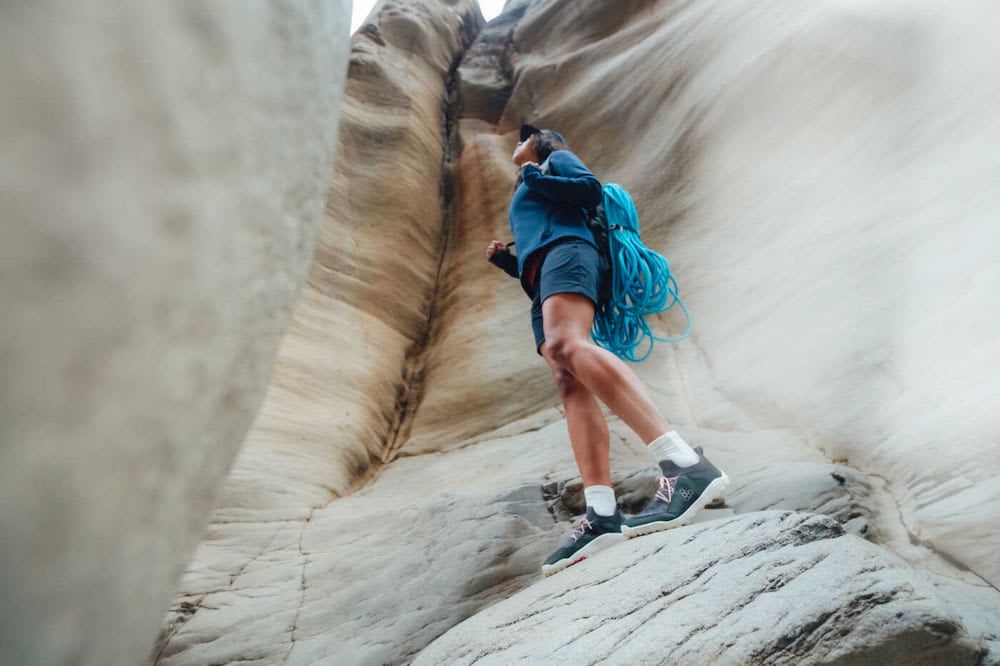
That takes us on neatly to your own programmes and initiatives that are helping to change the world – can you tell us about those?
"The starting point is the big thorny problem that the world makes 24 billion pairs of shoes every year. And nearly all those shoes are harmful to human health and super harmful to planetary health.
They nearly all end up in landfill, they’re nearly all made with either petroleum-based polymers or they're made with leathers that are tanned with heavy metals.
So the shoe industry is a big thorny problem for the world to fix.
If I start almost at the endpoint - 10,000 years ago humans made shoes, person by person, foot by foot from local, appropriate, sustainable materials.
In Africa, you would have sandals made from antelope skin, and if you were in the Arctic, you had boots made out of reindeer skin, and if you were living in the plains of America, you'd make moccasins out of bison skins and so on.
We believe with modern technology, we can go back to a system where there's a local-make-local cell model, using 3D printing, where smartphones can scan your foot and then local production cells can make shoes, bespoke to you in a completely circular way.
You go back to people really having shoes that perfectly fit them, made for them from locally appropriate, sustainable materials.
We have a programme called VivoBiome that we just launched which is the beginning of that vision. You scan your foot with your mobile phone, and then we make shoes for you as locally as possible, bespoke to you, that fit perfectly and allow you to move naturally.
Beyond that, we have the Live Barefoot Fund, our foundation which we’re obviously very proud to support. We support indigenous cobblers around the world and also research into exciting material innovations.
There are two other initiatives that we’re working on now. First, there’s our digital health education programme Vivo Health, where we're trying to build out a whole suite of holistic, natural health education because obviously, it starts with feet, but it doesn't end with feet.
It's amazing how few people are connected to their own personal agency to take responsibility for their health. Vivo wants to be part of that movement for people taking back control of their natural health so we're really invested in building an online education platform. That starts with movement, but then we have courses on breathwork, sleeping and general principles of intrinsic natural health.
Finally, we’ve got Revivo, our recommerce platform. That’s been going for a couple of years, and we've repaired nearly 100,000 pairs of shoes - the goal is that none of our shoes ever end up in landfill.
That’s based on the way we make them, the repairability, and a platform to resell them. The real goal is to end up by early next year with the same website giving a choice between buying a brand-new pair or refurbished."
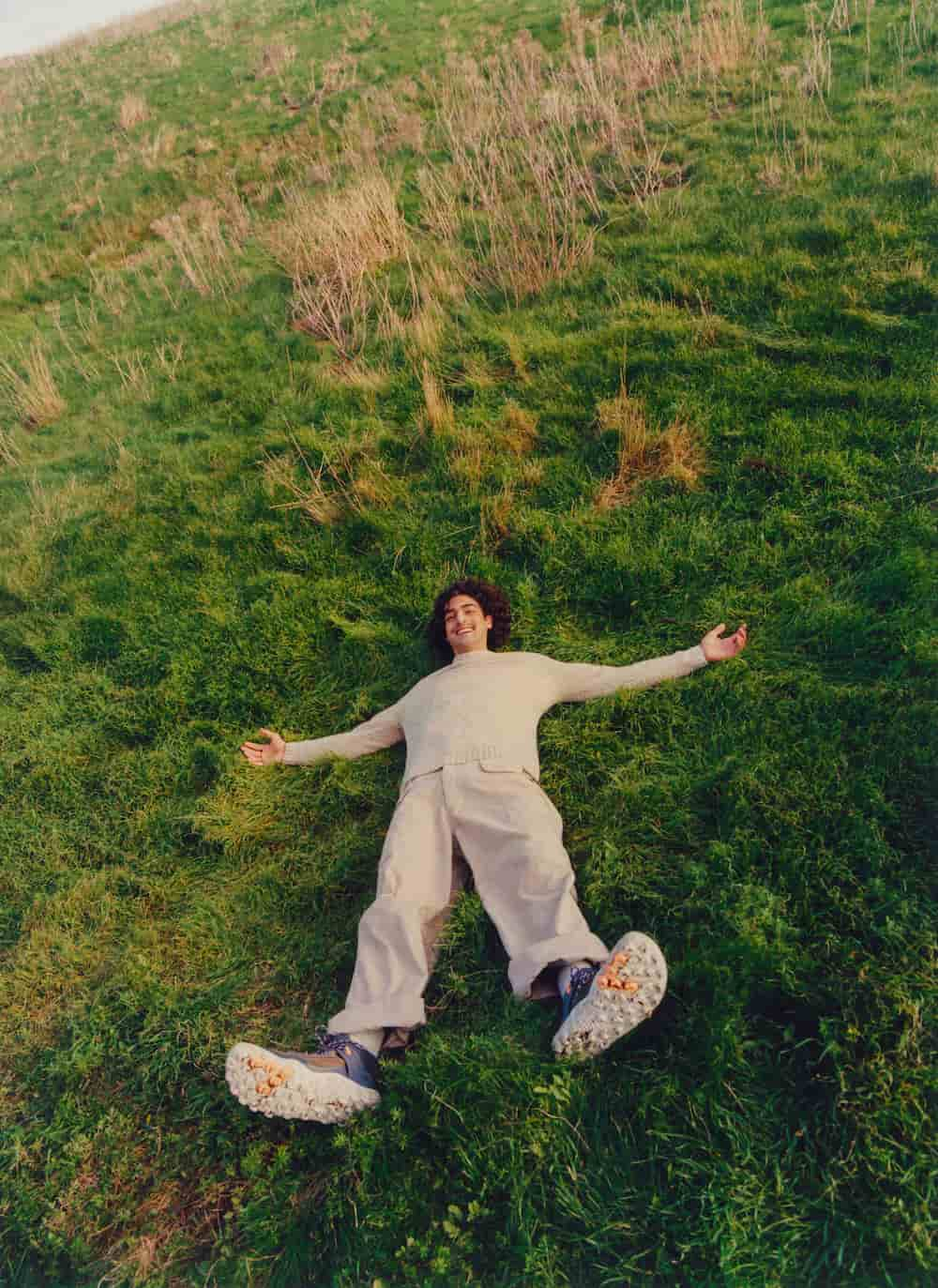
Fabulous initiatives. Let’s talk about your broader business philosophy now. We’ve spoken to James Timpson about upside-down management, Katie Vanneck-Smith, about work family, Shamil Thakrar about Seva. Do you have any business philosophies that are really important to you and the Vivo Barefoot leadership team?
"Since 2019 we’ve been pursuing what we call regenerative leadership, which goes back to what we were talking about earlier. We've been working with Giles Hutchins, spending time in his woods in Sussex for onboarding or team immersions.
Everybody in Vivo goes through this process because in a hybrid world, we try and build a much more distributed leadership, through the whole organisation. We talk about “self, circle and system”.
It starts with your own personal journey and connecting to nature yourself – it’s journey from “Head to Heart”. It connects to Vivo’s core mission which is its connection to nature, so we try to get everybody to go on that personal journey.
Then we progress to "circle", which consists of home circles - your department – and project circles, which lets everybody spend time in different projects or circles. That means nobody gets stuck in a silo and everyone is truly networked.
And then there’s the system, where you're connected to the overall strategy of the business and the mission of the business.
The principles of regenerative leadership are quite simple, there's a sense of autonomy, adult to adult, lots of feedback.
We have something called the Vivo Way, which is based on natural movement. Look at a four-year-old running around a swimming pool barefoot.
They have a perfectly upright posture. They have really quick rhythm, they're taking lots and lots of little steps. They're relaxed, they're laughing, they're having fun. In that movement, they're getting lots and lots of feedback from their feet. If they were to suddenly stand on a thorn, they go “ouch” and quickly course correct, and run out of the thorny patch.
We tried to embody that principle in the way we organise the business and encourage people to behave.
There’s clear structure, everybody knows where they are and gets their posture right, as it were.
We take lots and lots of super-fast quick steps, lots of feedback so you course correct quickly, and then importantly, be relaxed and in flow, working with the rhythms of nature."
Love the idea of a business philosophy based around happy four-year-olds! Let’s move on to community – building businesses where people share a mission and purpose.
Do you personally believe that it's possible to build a business 2023 without thinking about community and how community will help your growth?
"Community is something we're obsessed with, honestly.
We talk about being a community-led brand. Thinking back to our Quaker roots, it's one thing to build a business where the business is in a small village, with people and factories physically in it together, and the business is supporting house building and community centres and swimming pools.
In yesteryear, you saw those kinds of businesses, connected by a higher sense of purpose, often a spiritual one. It's an interesting challenge in the modern world.
Everyone’s scattered all over the world, mostly connected through devices, and everybody's higher purpose is not as easily defined as old spiritual ones were.
I'm really fascinated by how we scale at a community level and scale a business, which is ultimately building a community.
And by how we keep that community together, connected to some sort of sense of higher purpose.
In our case, we have our connection to nature. But not everyone will perfectly sense that, or prioritise that above other things in life. But it's essential to what we're trying to achieve.
We have to work extremely hard for that community to scale and stay together - for the culture to stay connected, beyond material gain.
I see so many businesses getting to 30 or 40 million revenue, and then accepting that new capital or corporations destroy their communities.
We’ve got big problems in the world, and we need thousands and thousands of businesses to scale with purpose.
Our crowdfunding had a clear mission, to be a part of us and help us. We were thinking in a community way when it was needed, but it was a springboard and saved us and I still really believe in that.
Crowdfunding has now gotten a slightly dodgy reputation, but I really do still believe in that model.
For example one of my dear friends is The Happy Pear, a really lovely business who’ve just done a crowdfund on a platform called Broccoli. They’re a community-based business, and they felt they wanted their community, who helped them develop their business, to have the opportunity to become an owner and share in their growth. There are hundreds of small businesses being funded like this, and they’re alive and kicking.
I think the pandemic really reminded people of the power of community. And in our case, reminded people about nature and health and collectively that we want to be together, not apart.”
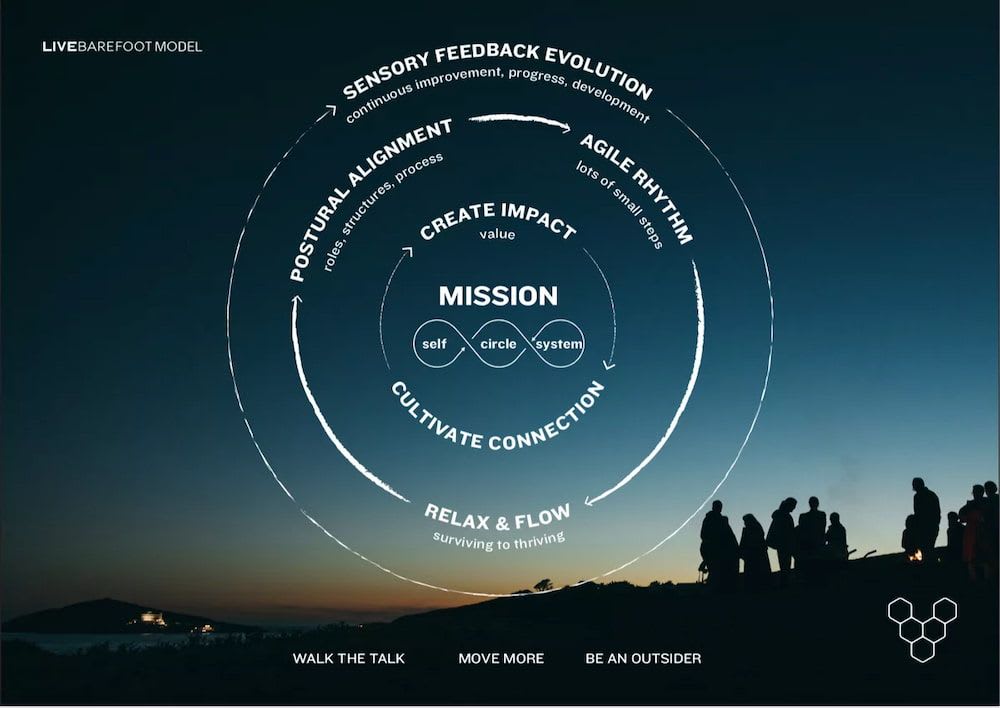
We ask everyone, are you a fan of business management books or podcasts? If so, what would you recommend?
"Definitely! Giles Hutchins has written a couple of books, one is literally called Regenerative Leadership. And the other one is called Leading by Nature. We work very closely with Giles and we talked about his work earlier so I'd recommend those books.
Podcast-wise – we sponsor one we particularly like, by Bret Weinstein and Heather Heying, called Dark Horse. They’re evolutionary biologists and Vivobarefoot is in many ways grounded in the science of evolutionary biology.
That's maybe the pointy end of reconnecting to nature, evolutionary biology. Bret and Heather are particularly good at that bringing that to life and making it simple. They’re reasonably controversial figures, but unfortunately, connecting to nature is a controversial thing these days, believe it or not. They wrote a book called A Hunter-Gatherer's Guide to the 21st Century and that's a wonderful book as well."
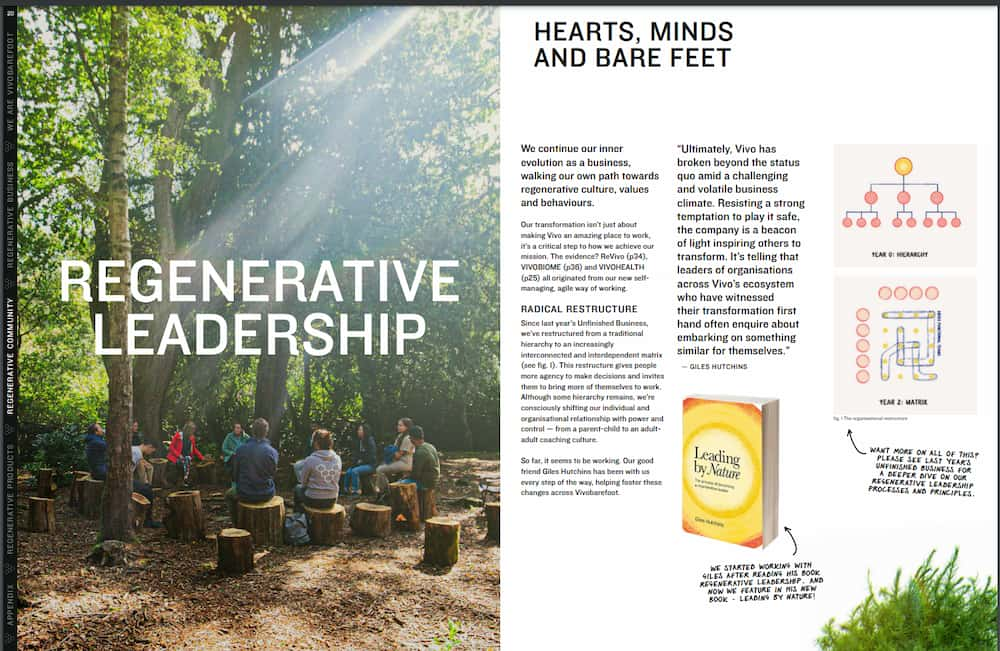
What advice would give to your younger self or in fact, any young entrepreneur starting a business today?
"Be brave, trust your gut instinct. As long as you have the first principles right.
In my case, learning about evolutionary biology and nature and natural ways, living systems was a really important filter, a philosophical starting point.
And as long as you have that right, and you're contributing in a positive way, helping as an economic agent, and you're genuinely supporting the wellbeing of society but with an accurate filter, then, just go for it. Never give up.
I think a lot of businesses end up “doing the wrong things righter”, rather than starting by doing the right thing.
I think just having that philosophical filter accurate in the first place is really important.
Mother Nature is the boss is one of the things I always say.
In my world of shoes there's lots of businesses making shoes that are deeply unhealthy to humans, but still calling them sustainable, or eco. And that doesn't that doesn't marry in my mind.
How can you diminish someone's human health and literally disconnect them from nature and still call them sustainable? Just because they’re made from some fancy materials."
Brilliant. Final question. What would you like to do if you weren't doing what you're doing now?
"I'd be a rap superstar. 10th member of Wu Tang Clan…
I obviously didn't make it as a rap superstar, so I ended up having to be a cobbler.
I did get to be on stage with them – Ghostface had me in a headlock. But the video evidence is in deep vaults under lock and key where they will remain!”
More Building Better Business Interviews
Learn from other founders, entrepreneurs and leaders who've featured in this series about better business practice.
Greg Jackson, founder of Octopus
Katie Vanneck-Smith, co-founder of Tortoise and now Chief Executive Officer of Hearst UK
Shamil Thakrar, co-founder of Dishoom
Sarah Waddington, founder of Socially Mobile
Shereen Daniels, author and MD HR rewired
Timpson CEO James Timpson
Saasha Celestial-One co-founder of OLIO
Sarah Jordan, founder of Y.O.U Underwear
Sarah Brown, founder of Pai Skincare
Ben Brooks-Dutton, Managing Partner at The Unmistakables
Emma Sexton, creative strategist and Founder, Inside Out Awards
Sam Branson, co-founder of HiddenLight and Big Change
Join Guild 🤝
See for yourself how the Guild experience is different to WhatsApp, Slack, LinkedIn or Facebook Groups.
Guild is a safe space to connect, communicate and collaborate with others.
Join us on a platform that is purpose-built for creating groups, communities and networks on mobile.